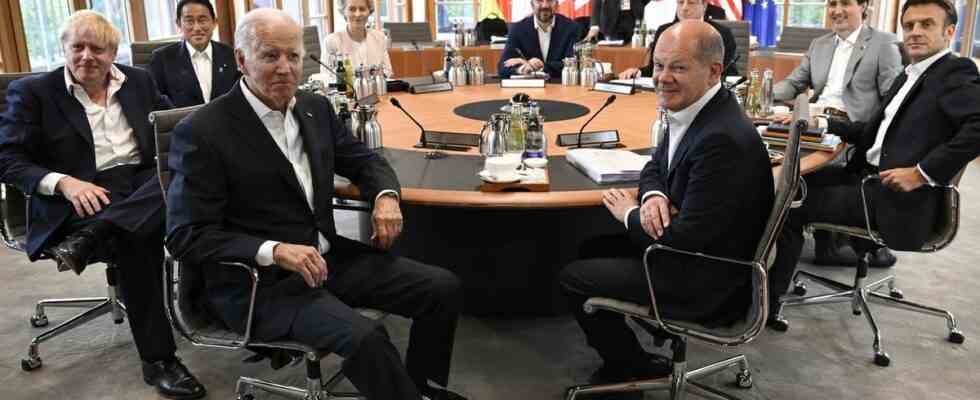Meeting in Bavaria from Sunday to Tuesday, the industrial powers of the G7 offered a range of responses to global crises. From the war in Ukraine to the threats of food shortages and the peril of the climate, a look back at the commitments made by the leaders of Germany, Canada, the United States, France, Italy, Japan and from the United Kingdom.
The war in Ukraine
Summit participants were keen to show a united face against Moscow. The allies notably promised to provide financial, humanitarian, military and diplomatic support and to remain at Ukraine’s side “as long as necessary”. The financial aid released for this country in 2022 now reaches 29.5 billion dollars. kyiv should also receive new armaments, in particular sophisticated American anti-aircraft missiles.
To further dry up Russia’s revenue, the G7 also plans to “work” on capping the price of Russian oil and imposing a ban on the import of Russian gold. To control the price of the black gold sold by Russia, the seven countries “are considering a series of approaches”, including “a possible ban on all services that allow the maritime transport of Russian crude oil and petroleum products”. , unless the oil is purchased below the ceiling that would be set.
China
Leaders in Germany have denounced Beijing’s “non-transparent and market-distorting” international trade practices. They therefore wish to free themselves from dependence on China, by “promoting diversification and resistance to economic coercion” and by “reducing strategic dependencies”. G7 members also raised concerns about human rights abuses in China, urging it to respect fundamental freedoms. They stressed that the situation in Tibet and Xinjiang, where “forced labor” is rampant, is of “great concern” to them.
The final statement also urges China to “fulfil its commitments” under the Sino-British Joint Declaration, guaranteeing Hong Kong certain freedoms and autonomy for 50 years under the “One country, two systems” model.
The food crisis
The G7 pledged an additional $4.5 billion to alleviate the global food crisis, bringing total joint commitments to $14 billion for the year. The seven powers also called on countries and companies with large food stocks to assume their responsibilities to alleviate the food crisis triggered by the conflict in Ukraine. They also urge “all countries to avoid excessive storage of food, which can lead to further price increases”.
The climate
The G7 countries have agreed to strengthen cooperation in the fight against global warming. But their ambitions, which come up against fears of energy shortages, have disappointed conservationists. The powers, which must in the short term do without Russian gas, are under pressure to meet their climate commitments.
In their final declaration, the Heads of State or Government certainly reaffirmed “their unwavering commitment” to the Paris Agreement, which aims to limit global warming to 1.5° above the pre-industrial era and their objective to achieve net-zero carbon emissions by 2050. They also underlined the “increased urgency to act” to reduce global greenhouse gas at 2019 levels. The G7 has also committed to a “highly decarbonized road sector by 2030”.
The summit also agreed to create a “Climate Club” made up of volunteer countries to coordinate and accelerate efforts to combat global warming. But critical voices pointed out after the summit that the idea remained vague and risked becoming “just another club”, according to Martin Kaiser, the executive director of Greenpeace in Germany.
energy
Emmanuel Macron, German Chancellor Olaf Scholz, US President Joe Biden, British Prime Minister Boris Johnson, Japanese Prime Minister Fumio Kishida, European Commission President Ursula von der Leyen, European Council President Charles Michel, Prime Italian Minister Mario Draghi and Canadian Prime Minister Justin Trudeau, have pledged to end, by the end of 2022, all new direct public support for the untapped international fossil fuel energy sector. However, in the face of the rush for alternative energy sources to emancipate themselves from Russian fossil fuels, the G7 agreed that public investments could be made in the gas sector “as an interim response”.

